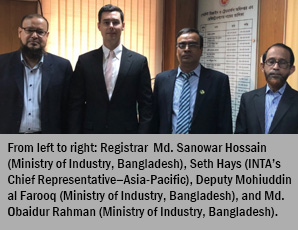Tackling Priority Issues in Thailand
Published: April 15, 2018
INTA has been working hard to address the issue of brand restrictions in the Asia-Pacific region. Following a submission regarding the “Public Consultation on Proposal to Introduce Standardised Packaging of Tobacco Products in Singapore” to Singapore’s Ministry of Health in March, INTA engaged policy makers and industry in Thailand on the same questions around brand restrictions.
At the same time, INTA worked with local industry to improve understanding of recent harmonization efforts in Thailand, given its recent accession to the Madrid Protocol.
Madrid Seminar The Intellectual Property Association of Thailand (IPAT) updated its members on the newly enacted Madrid Protocol process. INTA Board Member Louis Chan (P&G, Singapore) spoke on behalf of brand owners and provided insight on how Madrid is viewed by brands, and also shared some of the issues he faces regarding Madrid filings.
The Intellectual Property Association of Thailand (IPAT) updated its members on the newly enacted Madrid Protocol process. INTA Board Member Louis Chan (P&G, Singapore) spoke on behalf of brand owners and provided insight on how Madrid is viewed by brands, and also shared some of the issues he faces regarding Madrid filings.
IPAT members remarked that having the corporate view was tremendously helpful to understand more completely the Madrid System’s opportunities and challenges.
The seminar was held at Tilleke & Gibbins’ offices, and included more than 100 attendees from law firms in Bangkok. INTA was listed as a co-host of the event.
Thailand Brand Restriction Cross-Industry Dialogue On March 29, INTA and IPAT co-organized an industry dialogue on the growing issue of brand restrictions in Bangkok, Thailand. Speakers included industry representatives from the regulated industries, and those from industries that are indirectly affected by brand restrictions. Academics provided views on how innovation and entrepreneurship can be dampened by brand restrictions, while government authorities provided their views on the complexities of the subject.
On March 29, INTA and IPAT co-organized an industry dialogue on the growing issue of brand restrictions in Bangkok, Thailand. Speakers included industry representatives from the regulated industries, and those from industries that are indirectly affected by brand restrictions. Academics provided views on how innovation and entrepreneurship can be dampened by brand restrictions, while government authorities provided their views on the complexities of the subject.
Last year, Thailand passed a law to allow for tobacco plain packaging; other industries have been facing increasing regulations affecting the use of brands or co-branding in advertisements, social media, and other communications.
Kowit Somwaiya (LawPlus, Thailand) opened the event on behalf of the IPAT. He called on regulators and industry to work together in the best interest of consumers, and to seek common ground.
Seth Hays, Chief Representative, Asia-Pacific for INTA, provided an overview of INTA’s work on brand restrictions, in particular on the issue of plain packaging. He noted that INTA has two dedicated committee groups focused on the issue, including the Emerging Issues Committee-Brand Restrictions Subcommittee and the Legislation and Regulation Committee.
INTA and IPAT were pleased to have a representative from the Thailand Food and Drug Authority, Mr. Praphon Angtrakool, to provide remarks on the complexities faced by regulators, in particular in dealing with new technologies. He focused on how social media is an important driver of the public’s behavior, and should be a focus of regulators interested in protecting public health.
Samir Dixit, Managing Director, Asia Pacific for Brand Finance, shared a recently published report on plain packaging. The report stated that in a hypothetical situation where alcohol and other beverages are targeted for plain packaging, a potential sum of US $293 billion could be wiped out on corporate balance sheets. This emphasizes the immense value of brands to companies and the economic threat posed by brand restrictions.
Providing an academic overview of the current global state of brand restrictions with a focus on the current state of the Australia plain packaging World Trade Organziation dispute, Dr. Jakkrit Kuanpot (Tilleke & Gibbins, Thailand) summarized the current legal issues as essentially revolving around the TRIPs Agreement and Paris Convention. He noted that the issue of whether trademark rights are negative rights, or positive rights, is an important distinction, particularly in regards to arguments about whether plain packaging violates certain constitutional provisions on expropriation of property.
Dr. Eliza Stefaniw, Professor at King Mongkut University of Technology Thonburi, shared her thoughts on the impact that brand restrictions have on startups. She noted that trademarks, brands, and packaging designs have value, and startups are 100 percent focused on how to build up value. Brand restriction regulations, such as those in Thailand, can create regulatory uncertainty which inhibits the growth of these young companies. She shared a few case studies about innovative Thai startups that utilized packaging in a novel way to secure attention and market share.
One of the industries being directly affected by Thai regulations is the alcohol industry. A 2015 regulation on labeling restrictions has resulted in uncertainty for companies in this industry around the appropriate use of their brands, in particular in advertisements. Such restrictions include preventing the use of cartoon images, except those that were registered as trademarks before 2015, no claims on quality, and no use of “romance” language.
Rachanatorn Laohaphan (Diageo, Moet, Hennessy, Thailand), provided insight into the ways this regulation has impacted her business. She emphasized that education was a priority for her industry, and that some of the regulations focused on the industry are currently encouraging illicit products, may violate international agreements, damage brand equity and the economy, and discourage innovation.
Mr. Chan delivered a presentation on INTA’s response to plain packaging and brand restrictions. The key message was that brand restrictions are proliferating and pose a significant threat to the trademark community.
Jesse Lieberman, Legal Director, Minor Group-a hotel and hospitality company, shared his views on how the regulations on alcohol have impacted his company’s business through co-branding. Although his industry is not the focus of brand restrictions, it is suffering from unintended consequences. The hospitality industry caters largely to clients, which may include interests in alcoholic beverages. The industry had to deal with how it utilized images of alcohol, or co-branding in general, across a range of communications channels, including social media, traditional media, and even down to the images shown on menus. Mr. Lieberman emphasized the need for more legal clarity in the regulations, as well as distinctions between direct marketing of alcohol compared to indirect use or mention of alcohol in related industries.
Somboon Earterasarun of IPAT delivered closing remarks on the state of brand restrictions in Thailand as they are moving across different sectors of the economy, such as food, pediatric nutrition, and cosmetics-not just alcohol and tobacco. The Thailand Food and Drug Administration prevents 230 words from being included on cosmetics, which are causing a number of issues for brand owners. Food products are also facing increasing pressure from the regulators. Pediatric food regulations have been intensified since the enactment of the Marketing Control on Food for Infants and Young Children. B.E. 2560 (2017). Even dog food labels are being overly regulated, causing concerns for brand owners about the use of their registered trademarks. The Act’s impact upon, among others, the presentation of registered trademarks on infant food packages, is still highly uncertain.
Questions and discussion followed, moderated by INTA member Paramee Kerativitayanan (LawPlus Ltd, Thailand). The comments especially drove home the key point that brands play an important role in facilitating competition in the market between companies, and how brand restrictions ultimately interfere in the process, imposing costs on consumers and dampening innovation.
Nearly 70 attendees joined the half-day discussion in Bangkok. Attendees came from local law firms, companies, universities, and foreign and local government organizations, including the U.S. Embassy and the Thailand Department of IP.
Although every effort has been made to verify the accuracy of items in the INTA Bulletin, readers are urged to check independently on matters of specific concern or interest. Law & Practice updates are published without comment from INTA except where it has taken an official position.
© 2018 International Trademark Association